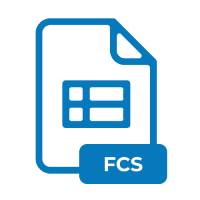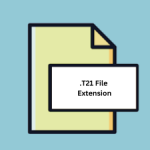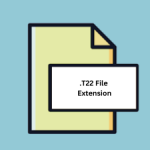.FCS File Extension

Flow Cytometry Standard File
| Developer | ISAC |
| Popularity | |
| Category | Data Files |
| Format | .FCS |
| Cross Platform | Update Soon |
What is an FCS file?
Flow Cytometry Standard (FCS) files play a crucial role in the field of flow cytometry, a powerful technique used in biology and medicine to analyze and quantify cells and particles based on their physical and chemical properties.
FCS files store the raw data generated during flow cytometry experiments, capturing information about fluorescence intensity, scatter, and other parameters.
More Information.
The development of the FCS file format dates back to the late 1980s when flow cytometry data lacked standardization.
The initial purpose was to create a universal format that could be easily interpreted by various analysis software and shared across different laboratories.
This standardization has greatly facilitated collaboration and data sharing in the scientific community.
Origin Of This File.
The FCS file format was developed by the International Society for Advancement of Cytometry (ISAC) to establish a standardized way of storing and exchanging flow cytometry data.
This standardization ensures compatibility between different flow cytometry instruments and software platforms.
File Structure Technical Specification.
FCS files have a well-defined structure that includes headers, text segments, and data segments. The headers contain metadata such as experiment details, instrument settings, and data acquisition parameters. The text segments store keyword-value pairs providing additional information, while the data segments hold the raw numerical data.
Technical specifications outline the required standards for FCS files, ensuring consistency and compatibility across different instruments and software applications. This includes guidelines for file encoding, header structure, and data representation.
How to Convert the File?
Windows
Converting FCS files on Windows is a straightforward process.
Follow these steps:
- Dedicated Software: Utilize specialized flow cytometry analysis software compatible with Windows, such as FlowJo or BD FACSDiva.
- Import Data: Open the software, navigate to the import or open option, and select the FCS file you wish to convert.
- Save or Export: Once the file is open, use the software’s export or save functionality to convert the FCS file into a desired format.
Linux
Converting FCS files on Linux involves open-source tools and programming environments.
Here’s a simple guide:
- Install FlowCore: Use R, a programming language for statistical computing. Install the FlowCore package for flow cytometry analysis.
- Write R Script: Create an R script to read and convert the FCS file. Save the script and execute it in the R environment.
Mac
Converting FCS files on Mac is similar to the Windows process:
- Mac-Compatible Software: Use flow cytometry analysis software compatible with Mac, such as FlowJo or FCS Express.
- Import and Export: Open the software, import the FCS file, and use the export or save function to convert it into the desired format.
Android
Converting FCS files on Android may require specific apps designed for flow cytometry analysis.
Here’s a general guide:
- Download App: Search for and download an Android app that supports flow cytometry data analysis and is compatible with the FCS file format.
- Open and Convert: Open the app, import the FCS file, and explore options within the app to convert or export the file into a different format.
iOS
Converting FCS files on iOS follows a similar approach to Android:
- Download App: Find and download an iOS app designed for flow cytometry data analysis and compatible with the FCS file format.
- Open and Convert: Open the app, import the FCS file, and explore the app’s features to convert or export the file into the desired format.
Advantages And Disadvantages.
Advantages
- Interoperability: FCS files promote interoperability between different flow cytometry instruments and analysis software.
- Standardization: Researchers benefit from a standardized format, simplifying data exchange and comparison.
- Metadata Inclusion: The file format allows for detailed metadata inclusion, ensuring comprehensive documentation of experimental conditions.
Disadvantages
- Complexity: The structure of FCS files can be complex, making them challenging for beginners or users unfamiliar with the format.
- Storage Size: Large datasets can result in significant file sizes, which may pose challenges in terms of storage and data transfer.
How to Open FCS?
Open In Windows
Software: Use dedicated flow cytometry analysis software compatible with Windows, such as FlowJo or BD FACSDiva.
Open In Linux
Software: Utilize open-source tools like FlowCore in the R programming environment for Linux-based analysis.
Open In MAC
Software: Mac-compatible flow cytometry analysis software like FlowJo or FCS Express can be used.
Open In Android
Apps: Look for Android apps designed for flow cytometry data analysis, ensuring compatibility with the FCS file format.
Open In IOS
Apps: Explore iOS applications developed for flow cytometry analysis, ensuring compatibility with FCS files.
Open in Others
Third-Party Tools: Consider using cross-platform tools like FCS Express or Cytobank that support multiple operating systems.













